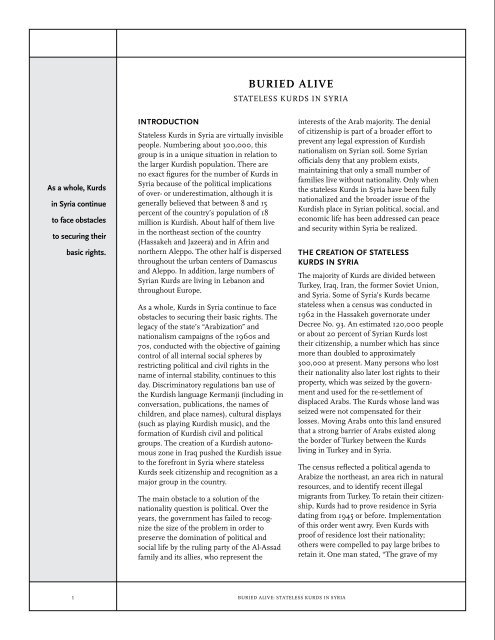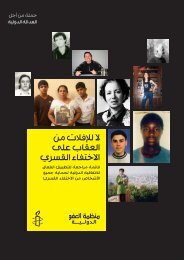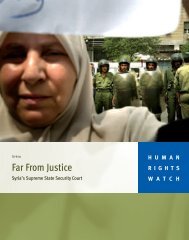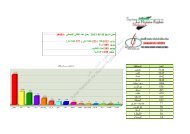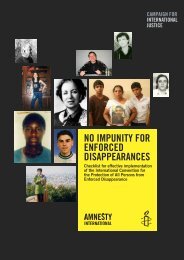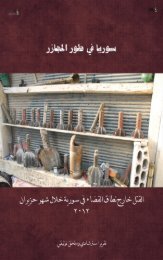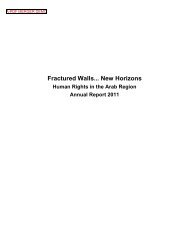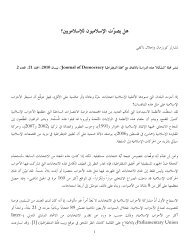BURIED ALIVE
BURIED ALIVE
BURIED ALIVE
You also want an ePaper? Increase the reach of your titles
YUMPU automatically turns print PDFs into web optimized ePapers that Google loves.
uried alivestateless kurds in syriaAs a whole, Kurdsin Syria continueto face obstaclesto securing theirbasic rights.introductionStateless Kurds in Syria are virtually invisiblepeople. Numbering about 300,000, thisgroup is in a unique situation in relation tothe larger Kurdish population. There areno exact figures for the number of Kurds inSyria because of the political implicationsof over- or underestimation, although it isgenerally believed that between 8 and 15percent of the country’s population of 18million is Kurdish. About half of them livein the northeast section of the country(Hassakeh and Jazeera) and in Afrin andnorthern Aleppo. The other half is dispersedthroughout the urban centers of Damascusand Aleppo. In addition, large numbers ofSyrian Kurds are living in Lebanon andthroughout Europe.As a whole, Kurds in Syria continue to faceobstacles to securing their basic rights. Thelegacy of the state’s “Arabization” andnationalism campaigns of the 1960s and70s, conducted with the objective of gainingcontrol of all internal social spheres byrestricting political and civil rights in thename of internal stability, continues to thisday. Discriminatory regulations ban use ofthe Kurdish language Kermanji (including inconversation, publications, the names ofchildren, and place names), cultural displays(such as playing Kurdish music), and theformation of Kurdish civil and politicalgroups. The creation of a Kurdish autonomouszone in Iraq pushed the Kurdish issueto the forefront in Syria where statelessKurds seek citizenship and recognition as amajor group in the country.The main obstacle to a solution of thenationality question is political. Over theyears, the government has failed to recognizethe size of the problem in order topreserve the domination of political andsocial life by the ruling party of the Al-Assadfamily and its allies, who represent theinterests of the Arab majority. The denialof citizenship is part of a broader effort toprevent any legal expression of Kurdishnationalism on Syrian soil. Some Syrianofficials deny that any problem exists,maintaining that only a small number offamilies live without nationality. Only whenthe stateless Kurds in Syria have been fullynationalized and the broader issue of theKurdish place in Syrian political, social, andeconomic life has been addressed can peaceand security within Syria be realized.The Creation of StatelessKurds in syriaThe majority of Kurds are divided betweenTurkey, Iraq, Iran, the former Soviet Union,and Syria. Some of Syria’s Kurds becamestateless when a census was conducted in1962 in the Hassakeh governorate underDecree No. 93. An estimated 120,000 peopleor about 20 percent of Syrian Kurds losttheir citizenship, a number which has sincemore than doubled to approximately300,000 at present. Many persons who losttheir nationality also later lost rights to theirproperty, which was seized by the governmentand used for the re-settlement ofdisplaced Arabs. The Kurds whose land wasseized were not compensated for theirlosses. Moving Arabs onto this land ensuredthat a strong barrier of Arabs existed alongthe border of Turkey between the Kurdsliving in Turkey and in Syria.The census reflected a political agenda toArabize the northeast, an area rich in naturalresources, and to identify recent illegalmigrants from Turkey. To retain their citizenship,Kurds had to prove residence in Syriadating from 1945 or before. Implementationof this order went awry. Even Kurds withproof of residence lost their nationality;others were compelled to pay large bribes toretain it. One man stated, “The grave of my<strong>BURIED</strong> <strong>ALIVE</strong>: STATELESS KURDS IN SYRIA


